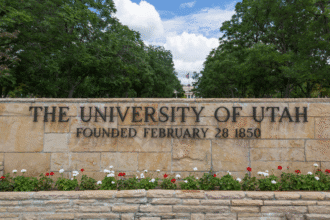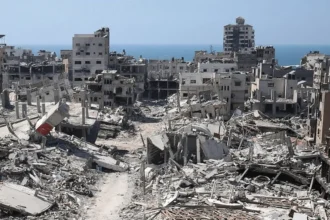Palestinian director Hamdan Ballal appeared three weeks before Hollywood’s cameras to accept an Oscar for Best Documentary Film. On Tuesday, he was once more in front of cameras, but this time, he had a damaged face, bloodstained clothing, and a wobbly walk following almost 24 hours of Israeli captivity.
- For what reason was Palestinian filmmaker Hamdan Ballal arrested?
- How Does the Israeli Military View Events?
- Was the Attack on the Filmmaker from Palestine Planned?
- Has International Recognition Improved the Situation of the Palestinian Filmmaker?
- How Should Palestinian Filmmakers and Activists Interpret This Event?
- Does Hamdan Ballal have justice?
Ballal said of the experience, “Settlers and soldiers were invading my home. They began to threaten me with their firearms and began to beat me. He said that before he was arrested, troops fired three warning shots into the air. Under arrest, he was blindfolded and kept under a frigid air conditioner while troops made fun of his Oscar victory.
International criticism of his incarceration has come from human rights groups advocating an inquiry into the treatment of Palestinian activists and reporters. Many believe his detention fits a more significant trend of repression against Palestinians recording bloodshed in the occupied territory.
For what reason was Palestinian filmmaker Hamdan Ballal arrested?
Violence broke out outside the hilltop home where the Palestinian filmmaker lives with his wife and kids in the southern occupied West Bank the night before his detention. His grey family car had ripped wipers, smashed windows, and shredded tyres, indicating the damage done.
Witnesses claimed that colonists attacked homes and automobiles as they tore through the territory. One witness said, “I saw around 15 settlers vandalizing homes, smashing cars, stabbing water tanks, and throwing rocks at anyone who moved.”
After suffering injuries, Ballal understood he required medical attention even as he tried to protect his family inside their house. He was arrested instead. Later on, his wife said that, expecting more violence, their kids hid inside their home for hours. She said they were afraid.
This episode is only one of numerous accounts of settler violence in the area. Human rights organizations have recorded a notable rise in attacks on Palestinian communities, most usually executed with impunity.
How Does the Israeli Military View Events?
The Israel Defense Forces (IDF) asserted that “terrorists hurled rocks at Israeli citizens, damaging their vehicles,” hence starting the violence. They said of the clash, “mutual rock-hurling between Palestinians and Israelis.”
Others, meantime, offer conflicting narratives. One observer noted, “What I know is that settlers harassed Palestinian shepherds, and then a settler mob started attacking houses.” Another observer related how he and his associates were singled out upon arrival: “Our three buddies stepped out of the car and were immediately attacked by settlers. One of them punched a friend in the face and neck; another was struck with a stick; a group of fifteen to twenty masked colonists began hurling rocks at our vehicle.
This interpretation is consistent with earlier studies showing Jewish settlers starting violence against Palestinian villages, usually with the backing or implicit approval of Israeli security authorities.
Was the Attack on the Filmmaker from Palestine Planned?
Many feel the attack lacked spontaneity. “This attack most likely was scheduled. A witness said: “You do not get a mob of twenty settlers attacking in the manner they did without some degree of coordination.”
Recent months have seen purportedly rising levels of violence from settlers. “This little community alone has had 45 attacks since the start of the year. A local said hundreds of attacks occur practically daily throughout the area. “We live in fear surrounded by armed settlers and soldiers while the police do nothing to guard us.”
Residents feel these acts are meant to drive them from their homeland. “This is not just about one night of violence,” remarked an elderly member of the neighbourhood. “It’s part of a long-term effort to make our lives so unbearable we have no choice but to leave.”
Has International Recognition Improved the Situation of the Palestinian Filmmaker?
Working with Ballal on the Oscar-winning documentary, his co-director hoped their worldwide exposure would help Palestinians live better. Disappointed, he raised the Oscar monument they had acquired in Los Angeles. “The film arrived on the most significant stage worldwide. Our village gained recognition by its name. That does not benefit us here, though, on the ground.
After posting bail, the Palestinian director was released, but he was immediately sent to the hospital for more treatment before going home.
Though much praised internationally, life in his hamlet is still rife with conflict and instability. “We hoped that an Oscar win would bring attention to our struggles and inspire actual change,” Ballal stated following his release. “But we still run the same risks and vulnerabilities here. Though the world may now know our names, that has not stopped the attacks.”
People all around are starting to notice. Declaring more protection for reporters and filmmakers operating in conflict areas, several international groups have denounced the attack and incarceration of Ballal. Reportedly underway are diplomatic initiatives to urge Israeli authorities to look at the violence and hold offenders responsible.
How Should Palestinian Filmmakers and Activists Interpret This Event?
The attack on Ballal draws attention to the risks Palestinian journalists, filmmakers, and activists face recording violations of human rights. For their work, many have experienced harassment, arrests, and even violence.
“Every time we tell our stories, we expose ourselves,” remarked another Palestinian filmmaker. “But should we fail, the world will never know what is happening here.”
Notwithstanding the difficulties, Palestinian directors keep recording their reality and use their art to spread awareness and call for change. Ballal noted in an earlier interview, “The power of storytelling is immense.” But along with tremendous power comes responsibility—and risk.
His detention started a more general discussion on press freedom and the rights of Palestinian storytellers. Advocacy groups call on Hollywood celebrities and foreign film companies to support Ballal and other Palestinian filmmakers who risk their lives to communicate their truth.
Does Hamdan Ballal have justice?
The responsibility for what happened remains unresolved as Ballal heals from his injuries. Independent inquiry into the incident and the Israeli military’s involvement in his arrest is demanded by Palestinian rights organizations.
Ballal and his family are left to pick up the fragments for now; they know that the violence could resurface at any moment. “We shall not stop sharing our stories,” he declared. “No matter how much they try to mute us.”
Although his Oscar victory temporarily elevated him to worldwide prominence, the ground reality remains the same for Ballal and all Palestinians striving to get their voices heard as the fight for justice never ends.








